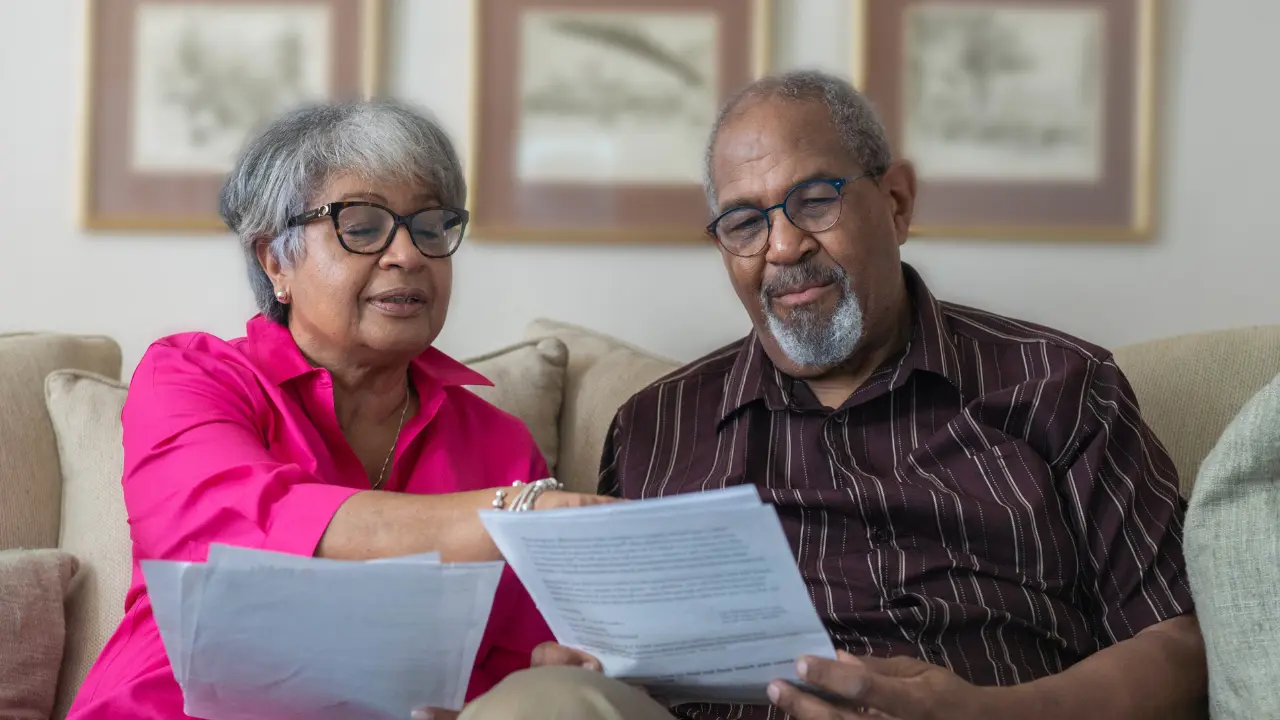Couples counseling questions serve as powerful tools that help partners explore their relationship dynamics, communication patterns, and shared goals. These carefully crafted inquiries create opportunities for honest dialogue and deeper understanding between partners who may be struggling to connect effectively on their own.
The right questions can unlock meaningful conversations about attraction, conflict resolution, expectations, and future aspirations while revealing underlying issues that may be affecting your relationship. Whether you’re addressing recurring disagreements, exploring how you express love, or examining how your individual values align, thoughtful questioning forms the foundation of productive counseling sessions that can strengthen your partnership and improve your communication skills.
Let’s dive into the top 10 couples therapy questions while also getting a glimpse of what to expect at SamaraCare and the questions to ask your partner before even beginning counseling.
1) What initially attracted you to each other?

This fundamental question appears in most couples therapy sessions and serves as a foundation for understanding your relationship dynamics. Your therapist will ask you to reflect on the early stages of your connection.
The question helps you remember positive aspects of your partner that may have become overlooked during current conflicts. You might discuss physical attraction, shared values, or personality traits that drew you together initially.
Your responses reveal important information about what you valued in a romantic partner. These insights can highlight whether those original attractions still exist or have changed over time.
Many couples discover they were attracted to complementary qualities in each other. You may have been drawn to your partner’s confidence while they appreciated your compassion or stability.
Therapists use this question to understand your relationship’s foundation and identify strengths to build upon. Your answers provide a starting point for exploring how your connection has evolved.
Sometimes, couples realize they were attracted to qualities that now create conflict. Your partner’s spontaneity might have been exciting initially, but now feels unpredictable or irresponsible to you.
The therapist will encourage both partners to share their perspectives without interruption. This creates space for you to hear how your partner viewed those early moments of attraction.
Your answers often reveal core needs and desires in relationships. Understanding what initially drew you together can help identify whether those needs are still being met in your current dynamic.
2) How do you typically handle conflicts together?

This question reveals crucial patterns in your relationship dynamics. Your conflict resolution style directly impacts your relationship’s health and longevity.
Many couples avoid discussing their conflict resolution strategies until problems escalate. Understanding your current approach helps identify areas for improvement.
Common conflict patterns include avoidance, escalation, or withdrawal. Some couples shut down completely, while others engage in heated arguments without resolution.
Your therapist will explore whether you address issues immediately or let them build up over time. They’ll ask about your communication styles during disagreements and whether you listen to understand or simply respond.
The question examines fairness in your conflicts. Do both partners get equal time to express their perspectives, or does one person dominate the conversation?
Your body language and tone during conflicts matter significantly. Effective couples therapy techniques focus on respectful communication even during heated moments.
Therapists want to know if you attack the problem together or attack each other. Healthy couples separate the issue from their partner’s character.
Your conflict recovery process is equally important. Do you reconcile quickly after disagreements, or do tensions linger for days?
Some couples use humor to defuse tension, while others need structured conversations. Understanding your natural tendencies helps your therapist recommend appropriate strategies.
The goal isn’t eliminating conflict but navigating it together effectively. Healthy relationships involve disagreements that strengthen rather than damage your connection.
Your answers help your therapist identify whether your current conflict style supports or undermines your relationship goals.
3) What are your expectations from this counseling process?

This question helps your therapist understand what you hope to achieve through couples therapy. Your expectations shape the direction and goals of your sessions together.
Common expectations include improving communication skills between partners. Many couples want to learn how to express their feelings without arguing or shutting down.
Some couples expect to resolve specific conflicts or recurring disagreements. Others hope to rebuild trust after betrayals or major relationship challenges.
You might expect to understand your partner’s perspective better. Couples therapy sessions often focus on helping partners see situations from each other’s viewpoint.
Realistic expectations involve gradual progress rather than immediate fixes. Relationship changes typically develop over multiple sessions with consistent effort from both partners.
Your therapist will likely discuss whether your expectations align with what couples therapy can realistically provide. Some expectations may need adjustment based on your specific situation.
Unrealistic expectations might include expecting your partner to completely change their personality. Therapy focuses on improving behaviors and communication patterns rather than fundamental personality changes.
Timeline expectations vary significantly between couples. Some see improvements within weeks while others need months of consistent work together.
Your therapist may explain that preparation for couples counseling includes clarifying your goals and expectations beforehand.
Both partners should share their individual expectations openly. Different expectations between partners can create additional challenges that need addressing in therapy.
Your expectations may evolve as therapy progresses. What you initially wanted might change as you gain new insights about your relationship dynamics.
4) Can you describe a recent disagreement and how it was resolved?

This question helps your therapist understand your current conflict patterns and resolution skills. Your response reveals how you communicate during disagreements and whether you work together toward solutions.
Choose a specific recent disagreement rather than speaking in generalities. Focus on concrete details about what happened and how you both responded.
Describe the initial trigger and how the conflict escalated. Be honest about your own reactions and behaviors during the disagreement.
Explain the steps you took to resolve the issue. Did you take time to cool down? How did you restart the conversation?
Share what communication strategies worked or failed. Disagreement itself isn’t harmful to relationships when handled constructively.
Detail how you reached resolution. Did you compromise, find a creative solution, or agree to disagree?
Your therapist will notice whether you blame your partner or take responsibility for your role. They’ll also observe if you focus on attacking character versus addressing specific behaviors.
If the disagreement remains unresolved, explain where you got stuck. This shows your therapist exactly where intervention is needed.
Your answer helps identify whether you use healthy conflict resolution strategies or fall into destructive patterns.
Be specific about emotions you felt and expressed. Your therapist needs to understand your emotional regulation during conflicts.
This question often reveals communication gaps that need attention. Your honest response gives your therapist a roadmap for helping you both improve.
5) How do you express love and appreciation to each other?

Understanding how you and your partner express love helps strengthen your emotional connection. Each person has different ways of giving and receiving affection that feel most meaningful to them.
The five love languages theory identifies key ways people express and receive love: words of affirmation, physical touch, acts of service, receiving gifts, and quality time. Recognizing your partner’s primary love language helps you show care more effectively.
You can establish rituals of connection where you regularly share specific things you appreciate about each other. This creates consistent opportunities to express gratitude and acknowledgment.
Simple acts of service demonstrate care through helpful actions. Cooking a meal, handling chores, or offering assistance shows love through thoughtful gestures that make your partner’s life easier.
Quality time involves giving your partner focused attention without distractions. Engaging in meaningful conversations or shared activities creates deeper emotional bonds between you.
Physical affection through hugs, kisses, or gentle touches communicates love for those who value physical connection. Small gestures of closeness can be powerful expressions of care.
Verbal appreciation through specific compliments and gratitude helps your partner feel valued. Telling them exactly what you appreciate about their actions or qualities reinforces positive behaviors.
You might try creating appreciation jars where you write down things you value about each other. This provides ongoing reminders of your mutual appreciation and creates positive reinforcement in your relationship.
The key is identifying which methods resonate most with each of you and consistently incorporating those expressions into your daily interactions.
6) What role does trust play in your relationship currently?

Trust serves as the cornerstone of any intimate relationship, creating the foundation for emotional safety and connection. When you trust your partner, you believe they care about your well-being as much as their own.
You feel secure knowing your partner will protect your emotions and consider your needs alongside their own interests. This security allows you to be vulnerable and open without fear of judgment or betrayal.
Trust manifests in daily interactions through reliability, honesty, and consistency. You depend on your partner to follow through on commitments and communicate truthfully about their thoughts and feelings.
When trust is present, partners feel secure, valued, and supported. You experience less anxiety about your relationship’s stability and can focus on building deeper intimacy.
The absence of trust creates insecurity and conflict in your relationship. You may find yourself questioning your partner’s motives or feeling uncertain about their commitment to the relationship.
Trust influences how you handle disagreements and navigate challenges together. When you trust each other, you approach conflicts as a team working toward solutions rather than adversaries.
Your current trust level affects your willingness to share personal thoughts, dreams, and fears. Higher trust encourages more intimate conversations and emotional closeness.
Building and maintaining trust requires ongoing effort from both partners. You must consistently demonstrate reliability, transparency, and respect for each other’s boundaries.
Examining your current trust dynamics helps identify areas needing attention. You can address specific concerns and work together to strengthen this fundamental aspect of your relationship.
7) Are there any recurring issues that you feel remain unresolved?

Recurring relationship issues signal that deeper problems need attention. When you find yourselves having the same arguments repeatedly, it indicates the root causes haven’t been addressed.
Perpetual problems often stem from personality differences or lifestyle mismatches. These issues don’t disappear on their own and require intentional work to manage effectively.
You might notice patterns in your conflicts. The surface topics may vary, but the underlying themes remain consistent. This repetition creates frustration and emotional exhaustion.
When couples argue about the same topics repeatedly, it reveals that deeper issues aren’t being resolved. You’re likely addressing symptoms rather than causes.
Common recurring issues include communication breakdowns, financial disagreements, intimacy problems, and household responsibilities. These topics resurface because the fundamental differences haven’t been explored or accepted.
Your counselor can help identify these patterns during sessions. They’ll guide you toward understanding why certain conflicts keep emerging in your relationship.
Unresolved arguments often require new approaches rather than repeating failed strategies. You need fresh perspectives on old problems.
Some issues may never be completely solved but can be managed better. Learning to navigate these differences with empathy and understanding reduces their intensity over time.
The goal isn’t to eliminate all disagreements but to prevent the same conflicts from damaging your relationship repeatedly. You can break these cycles with proper guidance and commitment.
Bringing up specific recurring issues helps your counselor understand your relationship dynamics. Be prepared to discuss which problems keep returning and how they typically unfold.
8) How do your individual values align or differ?

Understanding your value alignment creates the foundation for long-term relationship success. This question helps couples identify where they naturally connect and where they might face challenges.
Start by examining your core beliefs about family, career, money, and spirituality. Your partner should do the same independently before comparing responses.
Cultural and moral alignment plays a significant role in relationship strength. Shared ethics and fundamental beliefs contribute to deeper connection and understanding.
Consider how you each prioritize time and resources. Some couples discover they have different approaches to spending money or balancing work with personal life.
Use this discussion to highlight your shared values first. Celebrate the areas where you naturally align and build from that foundation.
Address differences without judgment. Value differences don’t have to create distance when handled with open communication and respect.
Explore why certain values matter to each of you. Understanding the reasoning behind your partner’s priorities helps build empathy and connection.
Couples can learn to compromise and find creative solutions when values don’t perfectly match. Focus on finding middle ground where both partners feel heard.
Remember that some differences can actually strengthen your relationship by bringing new perspectives. The key lies in maintaining respect and finding ways to honor both sets of values.
This conversation reveals how well you understand each other’s motivations and priorities. Regular check-ins about values help relationships adapt and grow over time.
9) What are your goals for your future together?

This question helps couples align their long-term visions and identify potential areas of conflict before they become major issues. You and your partner may discover that your dreams for the future don’t match as closely as you thought.
Discussing the future is a critical part of any relationship. When you explore your expectations and plans together, you strengthen your bond by addressing fears and encouraging mutual support.
Your therapist will guide you through conversations about where you see yourselves living in five years. They’ll ask about career aspirations, family planning, and financial goals. These discussions reveal whether you’re moving in the same direction.
You might discuss retirement plans, travel dreams, or lifestyle changes you want to make. Some couples discover they have conflicting views about having children or where to settle down. Others find they share similar values but haven’t communicated them clearly.
Setting realistic goals for couples therapy brings direction and purpose to your sessions. When you collaborate with your therapist to establish objectives based on your unique relationship, you create a roadmap for success.
This question often reveals deeper issues about commitment levels and relationship priorities. You may need to negotiate compromises or find creative solutions that honor both partners’ dreams.
Your therapist will help you identify which goals are negotiable and which represent core values. They’ll teach you how to support each other’s individual aspirations while building shared objectives. This process strengthens your partnership by ensuring you’re working toward a common future rather than pursuing separate paths.
10) How do each of you handle stress and support one another?

Understanding how you and your partner respond to stress reveals crucial patterns in your relationship. This question helps identify whether you turn toward each other or away during difficult times.
Stress affects everyone differently. Some people withdraw and need space, while others seek immediate comfort and connection. Neither response is wrong, but knowing your partner’s style prevents misunderstandings.
When stress strikes, couples often take stress out on each other rather than turning toward one another for support. This natural reaction occurs because stress triggers fight-or-flight responses.
Effective support starts with being open about your feelings. You need to communicate what type of support helps you most during stressful periods.
Some people prefer practical help like assistance with tasks. Others need emotional support through listening and validation. Discussing these preferences prevents partners from offering unhelpful support.
Active listening, emotional support, and sharing responsibilities represent key ways couples can support each other. Finding stress-relief activities to do together also strengthens your bond.
Pay attention to timing when offering support. Your partner might need space initially before they’re ready to talk or receive help.
Recognize warning signs that indicate when your partner feels overwhelmed. These might include changes in sleep, appetite, or communication patterns.
This question also explores whether you have constructive coping skills as a team. Healthy couples develop strategies that work for both partners while respecting individual differences.
The Importance of Asking the Right Questions

Asking the right questions in couples therapy creates safe spaces for honest dialogue and reveals underlying relationship patterns. Strategic questioning builds emotional safety between partners and identifies specific areas where change is needed.
Building Trust and Communication
Effective questioning techniques establish psychological safety in your therapy sessions. When your therapist asks open-ended questions about your feelings and experiences, you develop confidence to share vulnerable thoughts.
Questions like “What do you need from your partner when you feel overwhelmed?” create space for honest expression. Your responses help your partner understand your emotional landscape without judgment.
Trust develops gradually through consistent, thoughtful inquiry. Each question your therapist poses gives you practice articulating needs and concerns clearly.
The questioning process teaches you both to listen actively rather than prepare defensive responses. This shift from reactive to reflective communication patterns strengthens your emotional connection.
Key benefits include:
- Reduced defensiveness during difficult conversations
- Increased empathy between partners
- Better understanding of each other’s emotional triggers
- Development of healthy communication habits
Uncovering Core Relationship Issues
Therapeutic questions help couples understand their relationship better by revealing patterns that surface conflicts repeatedly. Surface-level arguments often mask deeper concerns about respect, intimacy, or shared values.
Your therapist uses targeted questions to identify these underlying issues. Questions about your family backgrounds, attachment styles, and relationship expectations expose root causes of recurring disputes.
Common core issues revealed through questioning:
- Different conflict resolution styles learned in childhood
- Unmet needs for emotional or physical intimacy
- Misaligned expectations about roles and responsibilities
- Financial stress or career priority conflicts
Pattern recognition becomes possible when questions trace your argument cycles back to their origins. You discover that fights about household chores might actually reflect deeper concerns about feeling valued or respected.
This understanding allows you to address actual problems rather than their symptoms.
How to Prepare for Couples Counseling Sessions

Preparing for couples counseling requires establishing clear objectives together and fostering an atmosphere where both partners feel safe to express their true feelings and concerns.
Setting Goals as a Couple
You need to discuss what you both want to achieve before your first session. Sit down together and identify the specific issues you want to address, whether that’s improving communication, resolving recurring conflicts, or rebuilding trust.
Write down your individual goals separately first. Then compare your lists and create shared objectives that reflect both perspectives.
Common relationship goals include:
- Improving daily communication patterns
- Learning conflict resolution techniques
- Addressing intimacy concerns
- Managing financial disagreements
- Navigating major life transitions
Your goals should be specific rather than vague. Instead of saying “communicate better,” specify “learn to discuss money without arguing” or “express needs without criticism.”
Reflecting on your relationship helps you articulate what changes you want to see. Consider what patterns you want to break and what new habits you want to build together.
Creating an Open and Honest Environment
You must commit to honesty with each other and your therapist. This means sharing difficult truths about your feelings, behaviors, and relationship concerns without holding back important information.
Establish ground rules for respectful communication. Agree to listen without interrupting, avoid name-calling, and focus on behaviors rather than character attacks.
Essential honesty practices:
- Share your real feelings, not what you think your partner wants to hear
- Admit your own mistakes and contributions to problems
- Express needs directly instead of expecting your partner to guess
- Discuss topics you’ve been avoiding
Starting this process with an open mind allows both of you to benefit fully from counseling. Accept that you’ll hear things that might be uncomfortable or surprising.
Create emotional safety by agreeing that what’s shared in counseling stays confidential between you two and your therapist. This protection encourages deeper vulnerability and more meaningful progress.
Navigating Towards a More Peaceful Life
In today’s fast-paced world, many couples find themselves facing relationship problems that can lead to stress and emotional disconnect. Couples counseling offers a path towards understanding and healing, helping partners improve their emotional connection and communication skills. Whether you are starting couples therapy or seeking to enhance your existing relationship, the right therapist can make all the difference. A licensed couples therapist at SamaraCare can guide you through the process, offering valuable insights and effective couples therapy exercises tailored to your situation.
During your first session, it’s important to ask the therapist the right questions to ensure you are both comfortable and aligned with the therapeutic approach. Couples therapy questions often include inquiries about your relationship dynamics, communication styles, and individual needs. These questions can help reveal underlying issues and foster a deeper understanding between partners. Additionally, worksheets and session questions can be utilized to facilitate discussions about intimacy, trust, and commitment.
Premarital counseling is another beneficial avenue for couples looking to strengthen their bond before tying the knot. It allows partners to discuss important topics and relationship questions that may arise in the future. As you navigate the complexities of your relationship, don’t hesitate to ask your partner the important questions that can lead to greater clarity and connection. Working with couples in therapy not only provides guidance but also fosters a supportive environment where both partners can express their feelings openly and honestly.
For many couples, counseling is an excellent step towards a more peaceful life. By engaging in therapy sessions, couples can learn effective strategies to maintain a healthy relationship and enhance their emotional intimacy. Keep in mind that the journey towards growth and understanding is unique for each couple, and finding a good therapist who specializes in marriage counseling can significantly impact your experience. Remember, the right questions and a willingness to explore your relationship can lead to profound changes and a renewed sense of partnership.
Frequently Asked Questions About Couples Counseling

Couples often need specific guidance on communication techniques, trust building, value negotiations, and maintaining intimacy during difficult periods. These questions address practical strategies for strengthening relationships while supporting individual growth.
What communication techniques can we practice to improve our listening skills with each other?
Active listening requires giving your full attention without planning your response. Put away devices and make eye contact when your partner speaks. Focus on understanding their emotions rather than defending your position.
Practice reflective listening by repeating back what you heard. Use phrases like “What I’m hearing is…” or “It sounds like you’re feeling…” This technique helps clarify misunderstandings before they escalate.
Set aside regular time for uninterrupted conversations. Create a safe space where both partners can express thoughts without judgment. Effective communication strategies help couples build stronger connections through improved dialogue.
How can we develop trust and understanding to sustain our relationship through challenging times?
Consistency in actions builds trust over time. Follow through on commitments and communicate openly about your limitations. Small gestures of reliability create a foundation for larger trust issues.
Share vulnerabilities gradually to deepen understanding. Discuss your fears, hopes, and past experiences that shape your reactions. This transparency helps your partner respond with empathy rather than frustration.
Practice forgiveness for minor mistakes while addressing serious breaches directly. Building stronger relationships requires acknowledging hurt feelings and working together toward a resolution.
What are effective ways to discuss and manage our differences in core values and beliefs?
Identify which values are negotiable and which are fundamental to your identity. Some differences can be bridged through compromise, while others require acceptance. Understand where you can find common ground.
Discuss how your values translate into daily decisions. Talk about parenting styles, financial priorities, and lifestyle choices before conflicts arise. This proactive approach prevents surprise disagreements.
Respect your partner’s right to different beliefs without trying to change them. Meaningful questions for couples can help you explore value differences constructively rather than defensively.
How can we maintain and strengthen our emotional intimacy during periods of stress or change?
Schedule regular check-ins to discuss emotional needs even when life gets busy. Share daily experiences and feelings to maintain a connection. These conversations don’t need to be lengthy but should be consistent.
Create rituals that reinforce your bond during stressful times. This might include a brief morning coffee together or bedtime conversations. Simple routines provide stability when everything else feels uncertain.
Express appreciation and affection despite external pressures. Acknowledge your partner’s efforts and offer physical comfort. Strengthening emotional connections requires intentional effort during challenging periods.
What strategies can we use to negotiate our needs and desires without conflict?
Present your needs as requests rather than demands. Explain why something matters to you instead of insisting your partner should automatically understand. This approach invites collaboration rather than resistance.
Practice timing your requests appropriately. Avoid bringing up sensitive topics when your partner is stressed or distracted. Choose moments when both of you can focus on problem-solving.
Brainstorm multiple solutions together before settling on one approach. Couples therapy techniques emphasize creative problem-solving that addresses both partners’ core concerns.
In what ways can we support each other’s individual growth without feeling threatened or neglected?
Celebrate your partner’s achievements without making comparisons to your own progress. Their success doesn’t diminish your worth. Express genuine pride in their accomplishments and milestones.
Maintain your own interests and friendships outside the relationship. Individual growth requires personal space and separate experiences. This independence strengthens rather than weakens your partnership.
Discuss how individual changes might affect your relationship. Share your goals and concerns openly so your partner can offer appropriate support. Relationship counseling approaches help couples balance togetherness with personal development.





